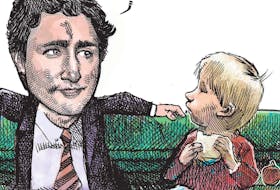Years ago, during one of his regular visits back to his native and beloved Newfoundland, my father was sitting with me one evening at a downtown tavern, sipping on a beer and listening attentively, as it turned out, to some of the obscenity-sprinkled conversations taking place at nearby tables.

“‘Ya know something, Bob,” he wondered aloud, in a recognizable tone that always forecast a pronouncement from my father (a colourful and entertaining raconteur) that he considered worthy of my rapt attention. “Newfoundlanders swear more often, and in more inventive ways, than any people, in any place, I’ve ever seen or been.”
And Dad had been around, had heard original swearing in locales from Rome to Dublin, from Las Vegas to the Azores, his employment in the airline business having given him carte blanche to travel the globe.
“Just listen,” my father said, his head nodding in the direction of the nearest group of mostly male imbibers. “They’re using the F-word as an adjective, adverb, a noun and everything in between.
I can’t help but think of all the grand stories I’ve heard, many of them in taverns, that would be a loss without the odd curse word.
“And Newfoundlanders are as fond of the C-word as the Irish are,” Dad continued, on a decided roll in his dissertation on international cursing habits. (He obviously used the actual word, but, given my super sensitivity to certain public mores, I’ve used an abbreviation, and will continue to do so during this particular contribution to the weekend reading habits of so many souls, cursers and non-cursers alike).
Now, Dad wasn’t being preachy or holier than thou; in fact, I think he was talking in rather matter-of-fact fashion, and I even sensed a bit of pride in his voice as he evaluated another unique aspect of the Newfoundland personality. And, in any case, he wasn’t averse to using expletives himself, although my sisters were genuinely shocked when I once told them about their father’s penchant for cursing.
“Daddy used the F-word!” Judy, one of my innocent siblings, exclaimed in genuine shock.
Anyway, that conversation with Dad all those thousands of nights ago returned to my noggin while reading an article in The New Yorker magazine this week about a drinking establishment in England that has decided to ban any sort of cursing on its premises, an edict that got me to thinking how such an order would go over here in Newfoundland.
Not too well, was my instant conclusion — unscientific, I’ll grant you, but based on an incalculable amount of anecdotal evidence, pleasurably (but sometimes painfully) gathered as a Newfoundland barfly for multiple years.
I can hear the new, sanitized language now:
First drunk: “Ya, say that again, male organ head, and I’ll kick the copulating excrement out of ya.”
Second drunk: “Aw, go fornicate yourself.”
Wouldn’t work, that’s for sure.
Besides, there are so many good sides to a rip-snortin’ swearing rant.
In that New Yorker piece, Emma Byrne, the author of “Swearing is Good For You: The Amazing Science of Bad Language,” was quoted as saying that profanity can ease pain, increase productivity and help foster social cohesion.
“It’s an intense emotional signal.”
People who think themselves too pious or pure to swear will never know the therapeutic value of stringing together cathartic curses. (They’re also very often the ugliest sorts of hypocrites; I’ve known many over the years who’ve condemned the use of profanity, didn’t curse themselves, but who made prolific use of the most mean-spirited, nasty and hate-filled language.)
But, on a more basic level, I can’t help but think of all the grand stories I’ve heard, many of them in taverns, that would be a loss without the odd curse word.
One of my favourites, told often by my father, in fact, concerned the German commandant of a British prisoner of war camp during the Second World War who had picked up just enough of the English language to mangle its usage with regularity. After an unsuccessful escape attempt, the commandant gathered the prisoners together to publicly berate them:
“You British soldiers,” he shouted. “You think something. You think I know F--k nothing.
"Well, I tell you this: I know F--k all.”
Or the grand yarn about Rover the horse in Torbay.
Seems Rover was for sale, and an American ventured out to the farm where Rover resided to have a look. And what he saw initially took his breath away. Rover, an almost disarmingly handsome horse, reared up on his hind legs and then began to gallop magnificently across the meadow towards the American and the farmer. It was a sight to behold. There was, however, a single tree, one lone tree, between the two men and Rover. And Rover proceeded to run smack dab into the tree, and knocked himself out a cold junk.
“My God,” said the shocked and bewildered American. “What’s the matter with that horse? Is he blind?”
“Naw, my son,” replied the farmer. “Rover ain’t blind.
"Rover just don’t give a f--k.”
A number of people have said I reminded them of Rover.
Could be.
Bob Wakeham has spent more than 40 years as a journalist in Newfoundland and Labrador. He can be reached by email at [email protected]









